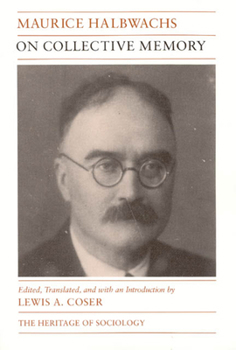On Collective Memory (Heritage of Sociology Series)
Select Format
Select Condition 
Book Overview
How do we use our mental images of the present to reconstruct our past? Maurice Halbwachs (1877-1945) addressed this question for the first time in his work on collective memory, which established him as a major figure in the history of sociology. This volume, the first comprehensive English-language translation of Halbwach's writings on the social construction of memory, fills a major gap in the literature on the sociology of knowledge.
Halbwachs' primary thesis is that human memory can only function within a collective context. Collective memory, Halbwachs asserts, is always selective; various groups of people have different collective memories, which in turn give rise to different modes of behavior. Halbwachs shows, for example, how pilgrims to the Holy Land over the centuries evoked very different images of the events of Jesus' life; how wealthy old families in France have a memory of the past that diverges sharply from that of the nouveaux riches; and how working class construction of reality differ from those of their middle-class counterparts.
With a detailed introduction by Lewis A. Coser, this translation will be an indispensable source for new research in historical sociology and cultural memory. Lewis A. Coser is Distinguished Professor of Sociology Emeritus at the State University of New York and Adjunct Professor of Sociology at Boston College.Related Subjects
History Politics & Social Sciences Social Philosophy Social Science Social Sciences TextbooksCustomer Reviews
Rated 4 starsCollective Memory
Halbwachs, Maurice. On Collective Memory. Translated and edited by Lewis A. Coser. Chicago: University of Chicago Press, 1992. Memory reconstructs images from the past in the context of our social present. Maurice Halbwachs' important work on the formation of collective memory insists that any recalled events fundamentally exist as a function of group endeavour. These memories, and the different behaviours they sustain,...
0Report
Rated 4 starsJust a word of advice for researchers
I have just received the book and the text seems to be great. I only think it should be worth advising readers that the first four chapters of "The social frameworks of memory" are abridged versions of the original French book (THey are considered - and probably they are indeed - "largely preparatory for what is to come in the rest of the book. Only relatively brief central pages if these chapters have been translated here"...
0Report
Rated 4 starsThe foundation of the sociology of memory
Maurice Halbwachs, french sociologist and student of Durkheim, died in Nazi camps in 1945. His work can be considered as the foundation of the sociology of memory, and is rediscovered today in Europe and in the US. An essential reading for any scholar interested in the relationship between history, memory, and the past.
0Report














